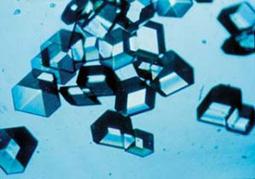
Insulin (Source:adm999.com)
A recent research discovers that the deficiency of a -arrestin-2 signal complex contributes to insulin resistance in human body and therefore results in type 2 diabetes. The research was carried out by a team led by Pei Gang, a CAS academician from Institute of Biochemistry and Cell Biology, Shanghai Institutes for Biological Sciences, Chinese Academy of Sciences. The related paper was published by Nature online January 5, 2009.
More than 25 million people diagnosed diabetes around the world, and in 20 years, the number could increase to 38 million. Type 2 diabetes is accountable for 90% of the diabetes cases and has been proved to be caused by insulin resistance, which means human body can generate enough insulin, but for some reason, cannot react to it.
Pei Gang and his team show that in diabetic mouse models, -arrestin-2 is severely downregulated. Knockdown of -arrestin-2 exacerbates insulin resistance, whereas increasing the level of -arrestin-2 restores insulin sensitivity in mice. Further investigation reveals that insulin stimulates the formation of a new -arrestin-2 signal complex, in which -arrestin-2 scaffolds Akt and Src to insulin receptor. Loss or dysfunction of -arrestin-2 results in deficiency of this signal complex and disturbance of insulin signaling in vivo, thereby contributing to the development of insulin resistance and progression of type 2 diabetes.
The new findings provides new insight into the molecular pathogenesis of insulin resistance, and implicates new preventive and therapeutic strategies against type 2 diabetes.
Paper abstract can be found at http://www.nature.com/nature/journal/vaop/ncurrent/abs/nature07617.html; Pei Gang's homepage: http://www.cell-research.com/editor/chief.htm.
Related News
Photos
More>>trade
- A leap second to be inserted at the New Year's beginning
- CAS to further cooperation with German academia in ocean studies
- Construction of largest aperture radio telescope starts in southwest China
- Premier urges scientists to help fight financial crisis
- CAS researchers receive TAN Jiazhen Awards for Life Sciences
market
- China's Think Tank Forecasts 8.3% GDP Growth in 2009
- Three Foreign Scientists Received 2008 CAS International Science and Technology
- 1:1,000,000 Geomorphologic Atlas of China to be Released
- Xu Guangxian Received China's 2008 State Top Scientific and Technological Awards
- Is Athlete's Brain Different from That of Average People?





